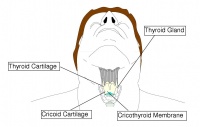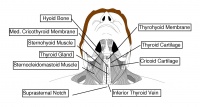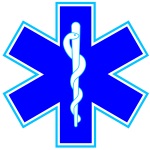Cricothyrotomy Surgical: Difference between revisions
From Protocopedia
mNo edit summary |
|||
| Line 38: | Line 38: | ||
* Continue to ventilate and observe chest rise. | * Continue to ventilate and observe chest rise. | ||
[[Category:Procedure Guidelines]] | [[Category:Procedure Guidelines|0910]] | ||
Latest revision as of 17:41, 1 February 2018
Procedure Guidelines 9.10
CRICOTHYROTOMY (SURGICAL)
INDICATIONS:
- If unable to ventilate and airway not patent, perform Cricothyrotomy, as listed on line 5, page 2-7 in the Practice Parameters.
- When an airway is needed and intubation is unsuccessful.
CONTRAINDICATIONS:
- Children under 12 years old.
- Known bleeding disorder and/or anticoagulant therapy.
- Unable to locate landmarks.
EQUIPMENT:
- #11 scalpel blade with handle.
- Needle nose hemostats.
- 5.0 to 7.0 mm endotracheal tube, cut above pilot balloon.
- Antiseptic swabs.
- Tape.
- BVM.
PROCEDURE: (refer to illustrations):

- Place the patient in a supine position with the neck in a neutral position.
- Palpate the thyroid notch, cricothyroid membrane, and the sternal notch for orientation. Gather equipment.
- Prepare site with Antiseptic swabs.
- Stabilize the thyroid cartilage with thumb and 3rd finger of hand. Stretch skin taut.
- Make a superficial transverse skin incision over the cricothyroid membrane. Carefully puncture through the membrane and maintain site with tip of gloved index finger.

- Insert the scalpel handle into the incision and rotate 90 degrees to open airway OR insert hemostats to enlarge opening for passage of tube.
- Insert cuffed endotracheal tube into the cricothyroid membrane incision directing the tube distally into the trachea.
- Inflate the cuff and ventilate the patient with BVM.
- Observe breath sounds and auscultate the chest for adequate ventilation.
- Secure the endotracheal tube.
- Continue to ventilate and observe chest rise.
